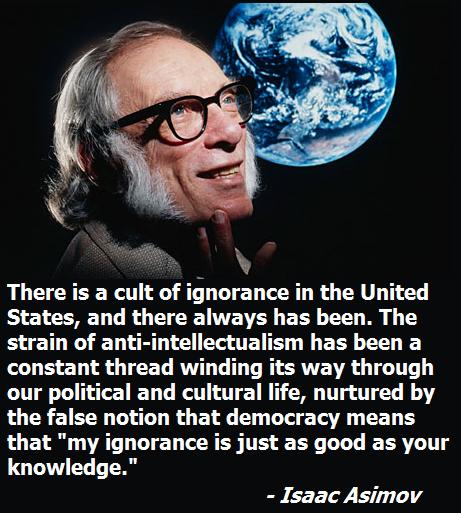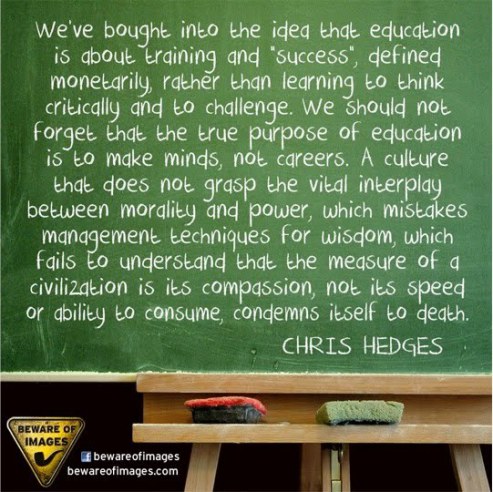Anti-intellectualism is far too pervasive in our world. Although, it is not a new problem.

We regularly complain about anti-intellectualism existing among our students. We say, “they can’t think,” “they don’t know how to question and evaluate information,” or “they believe everything they are told, especially if it’s on the computer.”
We say the nation’s elected and unelected officials are greedy and uneducated.
Sometimes we are all just as bad, but in our own way. In order to help others think outside the box, we must do the same aggressively and constantly.
As creative thinkers, we are generally very good about thinking outside the box if it relates to our very specific research, if it is in the distant past, and/or if we have no immediate personal or emotional connection.
When it comes to more recent “stuff,” however, we often do very poorly.
Media, politicians, and the culture at large do not want us or anyone else to think. Even the official Republican Party platform in Texas recently described “critical thinking” as the enemy – this is mirrored throughout our society.

Our kind is often too intermixed with contemporary prejudices, practices, and pronouncements. And in order to be better scholars and to avoid the mistakes of our intellectual relatives, we need to be especially critically-minded about anything that enjoys popularity en masse. We must use our knowledge to speak out and speak often so people will see our relevance.
Take one example: On average, each person regardless of formal education watches 4 hours of television every day. This means that even researchers, lawyers, and teachers, on average, watch 28 hours of television every week. Research has thoroughly documented the negative consequences of watching almost any television. (See Four Arguments for the Elimination of Television, Television and the Quality of Life, and Bowling Alone for some of excellent works on this subject. BTW, no one likes it when I suggest they should reduce or eliminate television consumption.)
Another example: this past Sunday, I started an online discussion and through the comments it evolved into a few different things, but the basic message was that U.S. football is racist and that, considering the system we have, there are many relevant parallels to slavery and lynching. I also believe that football (and not counting games in the backyard) is so dangerous that it should be abolished. There is plenty of evidence and published secondary material to support these assertions. Nonetheless, this discussion generated comments saying I was ridiculous, perpetuating stereotypes, was being racist myself, and wasn’t seeing the full picture. Not many wanted to really discuss the actual issues at hand, and it became personal very quickly for all of those involved.
Stop and think about it. Football has an insane place in popular culture right now. Suggesting football is less than “all American” might as well amount to treasonous statements. Yet, oddly, given our horrible track record as a nation and our very violent culture, football is probably the most “all American” event there is.
It is not about agreeing or disagree. Rather, scholars should be about to “entertain a thought.” New ones, old ones, even the uncomfortable ones. We need to regularly challenge what is most sacred and automatic in our life and culture.
Far too often, our kind—thinkers, writers, teachers, researchers—has unknowingly participated in or even caused anti-intellectualism and the true perpetuation of stereotypes. Scholars, as you know, have been leading authorities in saying that the heaviest object would fall fastest, that women were not human, that Indians and Africans were biologically inferior and needed to be enslaved, that lynching and segregation were justified, that women who were raped could not become pregnant – the examples are endless. A recently published book explains how intellectuals built the American university system on three pillars: the church, the State, and the institution of slavery.
We need to change our all-too-predictable patterns of behavior.
We need to live in this time but not be of this time.
I’m reminded of a quotation from a British movie History Boys:
But this is History. Distance yourselves. Our perspective on the past alters. Looking back, immediately in front of us is dead ground. We don’t see it, and because we don’t see it this means that there is no period so remote as the recent past. And one of the historian’s jobs is to anticipate what our perspective of that period will be.
Except for referring to history as dead ground, I love this quotation because it recognizes how very hard it is to see recent events with critical eyes or eyes at all.
We should strive extra hard to maintain a distance from trends and fads, the immediate day-to-day news, and whatnot. Even when we maintain a distance from everyday life, we are inevitably going to have difficulty seeing things that are wrong today. We need to hypothesize how the future will look at today. What things are we doing today that will be judged unimaginable by the future. What are we doing today that parallels the once naturalness of enslavement or segregation, for example, that is inhumane to the core?
We should not only welcome unpopular opinions, but we should celebrate such ideas and consider them for all that they are worth.
We need to be must be activists, in addition to our other scholarly endeavors. Like some European scholars, we should actively engage in contemporary cultural concerns.
